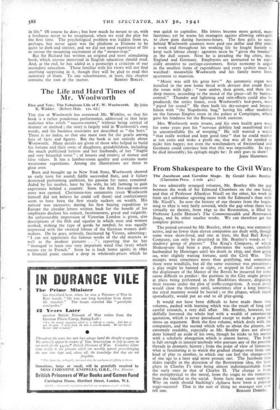From Shakespeare to the Civil Wars
The Jacobean and Caroline Stage.- By Gerald Eades Bentley (Clarendon Press. 2 vols 42S.) IN two admirably arranged volumes, Mr. Bentley fills the gap between the work of Sir Edmund Chambers on the one hand, and that of Professor Allardyce Nicoll on the other, his work in form an i substance agreeing more with Sir Edmund's than with Mr. Nicoll's. So now the history of our theatre from the begin- ning to i85o is very fairly covered, while the gap when there was virtually no theatre, from 1642 to the Restoration, is filled by Professor Leslie Hotson's The Commonwealth and Restoration Stage, and by other smaller works. We can therefore get the complete picture.
The period covered by Mr. Bentley, 1616 to 1642, was extremely active, and no fewer than eleven companies are dealt with, though some were short-lived, and one at least, the Red Bull King's Company, can only be described in Mr. Bentley's words .as "a shadowy group of players." The King's Company, of which Shakespeare had been a part, dominates the scene, carefully husbanded by Heminges until his death in 163o, and then going on, with slightly waning fortune, until the Civil War. The receipts were sometimes more than gratifying, and sometimes there were windfalls, but all the same existence was precarious ; a play might be banned at sight, or stopped in full career, or the displeasure of the Master of the Revels be incurred for some cause difficult to predict: the puritans in the City might protest at plays being performed in the Blackfriars theatre, disguising their reasons under the plea of traffic-congestion. A royal death would close the theatres until, sometimes after a long interval, the royal mummy would be buried ; or the plague, which raged sporadically, would put an end to all play-going.
It would not have been difficult to have made these two volumes, packed with learning which was the result of long and careful research, a very dull affair. Mr. Bentley, however, has skilfully leavened the whole loaf with a wealth of entertaining quotation, which is never introduced except to make a point or stress an argument. Both the first volume, which deals with the companies, and the second which tells us about the players, are extremely readable, especially as Mr. Bentley does not always deny himself an aside of his own, though he sticks to his matter with a scholarly abnegation which is almost heroic. The book is full enough to intereseanybody who pursues any of the possible threads in dramatic history ; from the point of view of literature, what is fascinating is to watch the gradual change-over from one kind of play to another, in which one can feel the change-over of one age to a later anti more prosaic one. The Jacobean idea slides rapidly in the direction of the Restoration idea, the later plays in Charles I'S time being almost indistinguishable from the early ones in that of Charles II. The change is from the metaphysical to the moral, from the tragic to the romantic, from the fanciful to the social. Some facts may cause surprise. Why on earth should Suckling's Aglaura have been a popular stage-success? That is the sort of thing no manager can ever






























 Previous page
Previous page